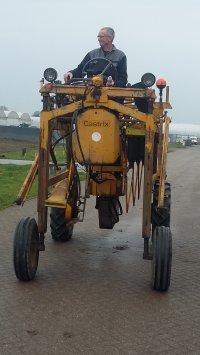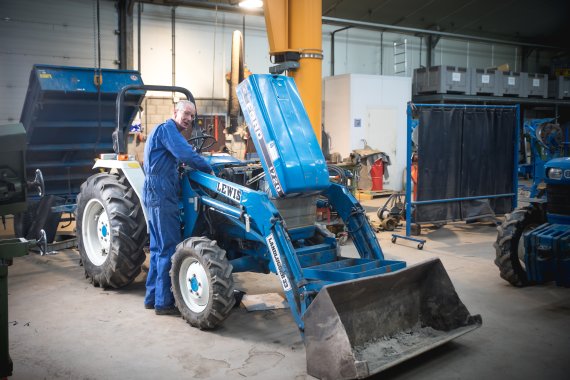Mechanic Hans Jansen will retire in September after more than half a century of working for WUR.foto Sven Menschel
Hans Jansen studies the tractor part carefully. It is a filter element and a big chunk of the steel has broken off. How did that happen? Jansen has no idea. ‘But I will find out,’ says the technician at Unifarm, the Wageningen University farm, located behind Radix.
On 16 April, Jansen will have been working for Wageningen University & Research – or its predecessors – for 50 years. He started his career in 1968, at the age of 16, at the then Institute for Breeding Horticultural Crops (IVT) on the Mansholtlaan, roughly where the FrieslandCampina research centre stands now. He grew up in a house just a few streets away on the Vergersweg.
I would rather have gone to college but that wasn’t an option then
Evening classes
Jansen’s father worked in horticulture too. ‘It was logical at the time to do the same,’ says Jansen, who focused on the mechanics of farm machinery because that interested him. He took evening courses and trained as a mechanic. ‘If I could choose again now, I would opt to go straight on to college, but I didn’t have that option then.’ There’s a tinge of regret in his voice. ‘The Netherlands was still in the post-war reconstruction phase. There wasn’t much money and if you could earn your keep, you had to do so. We did have a lot of discussions at home. The vocational college was just 25 metres away but I didn’t get to go there. I had to go out and earn. I made about 450 guilders a month. That was a decent salary.’
He has taken off the giant back wheel of the tractor – a New Holland. Today Jansen wants to replace the damaged part and he can’t do that without taking the wheel apart. How long does a job like that take? Jansen has no idea. ‘So many other things come up in between.’
All that other work has increased over the years, he says. Thanks to all the reorganizations, his team has become broader and broader. Now Jansen not only tinkers with tractors but with all kinds of technical installations as well. This week, for example, he was still working on a GPS system with which researchers can determine their precise location.
Overtime
The work has become more stressful too, Jansen feels. ‘Experiments have a shorter time span. So if the weather is bad or a machine breaks down, a solution has to be found immediately. Leaving the work for a while is hardly an option anymore.’ This also means that Jansen regularly works late to get something finished. Too late sometimes, thinks his boss Gerard Derks. But Jansen says: ‘You’ve got to help your colleagues, haven’t you?’
In 1980 the IVT – which created the Elstar apple, among other things – was merged with other horticultural institutes. Another merger followed in 1998, and this time the Wageningen research institutes merged with the university. Teams expanded and relations with colleagues became less close. Jansen: ‘In the old days we knew exactly what we could expect of each other. You could crack a lot more jokes, too.’
With his colleague Evert Jan Haalboom, for example. Jansen starts to laugh at the thought of him. ‘He was always such a joker. One day his colleagues got their own back. Just before he went off for lunch, they smeared grease on the inside of his helmet. He was very late back from lunch and his hair was standing on end like a punk’s. He had washed his hair twice but it didn’t help.’ Jansen grins.
Just as Jansen wants to start putting in the filter element, his telephone rings. It is a colleague who wants to mow one of the trial plots and can’t get the mower open. Jansen drops his work, gets in the company car and drives off.

Hans Jansen test-drives a maize picker.
Close
Jansen regretted the loss of close working relationships over the years, he explains in the car. Each organization had an effect. Especially around 2000, when he had to apply for his job again. Things were not going well financially in those days, and there wasn’t always enough work. About half the jobs on the experimental farm were slashed. Twice, Jansen thought about leaving. Once to an agricultural college, and once to a mechanization company. ‘Our work here is sometimes undervalued. Everything you do is taken for granted, and the pay is better elsewhere too.’ But in the end, WUR’s good pension scheme held him back.
And at the same time, Jansen does think there is something special about working for a university. ‘Standard solutions hardly ever work here, and that makes for plenty of challenges.’ For example, he adapted harvesters so they could be used for small quantities. That is ideal for small trial plots. And nowadays, Jansen thoroughly enjoys helping students with the projects. ‘When I first started I had no contact at all with students. They belonged to a different world.’
And there haven’t been any more reorganizations in recent years. That period of calm has done Jansen good, his colleagues say. And he got more chance to do things his own way. Like arranging his workshop, shed 6, the way he wanted. He’s one of the few employees at Unifarm to have an office of his own, even if he has recently had to start sharing it with the new drone team.
Retiring
His colleague’s problem in the field proves easy to solve. After some pushing and shoving, and a drop of oil, the mower opens out. Jansen drives back to the workshop and devotes himself to the tractor again. In order to place the filter element, he has to take out a few other parts. He takes hold of a gigantic pair of pliers.
Jansen will be retiring in September. Much to his colleague’s regret, as they have no idea who can succeed him. They asked if he would like to go on working a couple of days a week after retiring, but he declined. ‘No, if I worked two days, my colleagues would have so many questions and I’d have to do even more overtime. Anyway, I’ve got enough to do at home.’
Half an hour later, the filter element has been replaced and Jansen puts the tractor back together again. He’ll never know exactly what went wrong. But the tractor will go again now.

